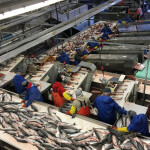The Vietnam Association of Seafood Exporters and Producers (VASEP) and the National Fisheries Institute (NFI) on Friday responded to the release of the U.S. Department of Agriculture’s much-anticipated rule for inspecting domestic and imported catfish.
The rule stems from a measure in the 2008 Farm Bill that would charge the USDA with inspecting catfish. Currently, it’s the U.S. Food and Drug Administration’s responsibility. The rule had been delayed for more than two years.
The rule is a draft and is due to be published in the Federal Register on Thursday, according to Gavin Gibbons, director of media relations for the National Fisheries Institute. Once the rule is published, a 120-day public comment period will begin, meaning the final rule could be issued as early as June, he explained.
NFI opposes the measure, arguing that inspection of catfish and all seafood should remain with the FDA. “It’s a mess from start to finish. It’s a USD 30 million solution looking for a problem,” Gibbons told SeafoodSource on Friday, referring to the cost of launching a catfish-inspection program within the USDA.
The USDA has already transferred its Office of Catfish Inspection to its Office of Field Operations, an indication that the agency is preparing to implement the program, said Gibbons.
What’s more, nowhere in the measure or the rule does it state that the FDA will be relieved of its duties, meaning two agencies will be responsible for inspecting catfish, noted Gibbons.
One big question that the rule failed to clarify is whether pangasius, a catfish-like species farmed primarily in Vietnam, will be included in the program. VASEP urged that pangasius not be included in the rule, pointing to a 2002 law mandating that only fish in the Ictaluridae family be classified as “catfish.” Pangasius — also knows as basa, swai or tra — is in the Pangasiidae family.
Added VASEP, “We believe it is important for U.S. consumers to know that the seafood we produce in Vietnam is safe and nutritious. Pangasius, in particular, now meets or exceeds all mandatory requirements for export to world markets, including HACCP. In addition, our exporting companies comply with a range of stringent voluntary programs such as GlobalGAP, the British Retail Consortium, SQF 1000 and USDC. To suggest otherwise, as the U.S. catfish industry continues to do, does a disservice to U.S. consumers, retailers, restaurant operators, and importers — all who enjoy our high-quality, safe, versatile and affordable fish.”
The measure has the backing of The Catfish Institute and numerous Southern legislators, including Sen. Blanche Lincoln (D-Ark.). The Catfish Farmers of America has launched an aggressive campaign against imported catfish and pangasius that includes TV advertising.





